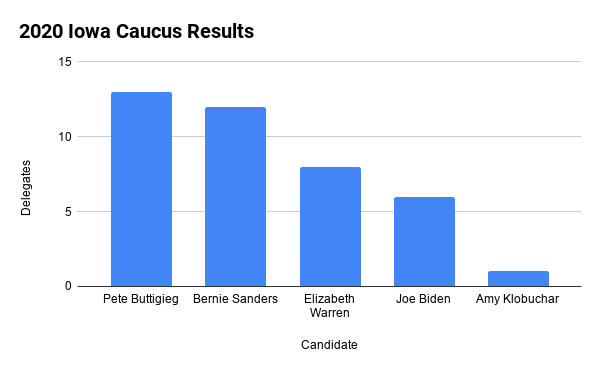
The first results of the 2020 Democratic Party caucus came in seven days late, according to the Chicago Tribune. This wasn’t supposed to happen.
The goal, according to USA Today, was for the 2020 Iowa Caucus to use an app developed by Shadow Inc. to tally votes. A problem arose when inconsistencies were discovered in the way the app was reporting data, according to Shadow’s spokeswoman, Mandy McClure. There have allegedly been questions as to whether this app was subjected to appropriate security testing.
The Democratic Party released official results on Feb. 9. Pete Buttigieg came out on top with 26.2% of the delegate vote. Bernie Sanders’ campaign allegedly requested for the party to double-check the math, which is why results are still not finalized. Bernie Sanders lost to Buttigieg, with 26.1% of the delegate vote.
While accurate reporting was still possible because the paper records were still intact, according to the New York Times, the issue delayed results and disheartened voters.
Despite the difficulty in Iowa disappointing many, the New Hampshire primary seems to have been an improvement. No issues occurred, and Sanders won the state, according to CNN.
Despite the difficulty with the Iowa caucuses, freshman Lillian Chen thinks it will not hinder the party as a whole.
“The fact that [the developers] didn’t fix it before might be more of an issue than the actual mistake itself,” Chen said.
Despite its importance, not everyone knows what a caucus really entails.
According to the Bill of Rights Institute, a caucus is a meeting of a political party’s supporters to choose a candidate for an election. A primary is a different method of selecting a party’s candidate for a general election. State governments, not parties, organize primaries, and voters cast secret ballots.
Normandy Ng, a senior at Carlmont, is not a huge supporter of caucuses.
“People don’t really do their own research when it comes to that kind of stuff, and they only agree with whatever is being projected to them,” Ng said.
Ng isn’t alone in his thoughts about the efficacy of caucuses. According to an AP research study, 40% of Americans had little confidence in the fairness of either party’s nomination system. According to the same survey, only 17% of Americans thought caucuses were fairer than primaries.
But not everyone is dissatisfied with the caucus system. Grace Xu, a sophomore, thinks caucuses add a benefit to our electoral system.
“I think that [caucuses] really help because it gives the people a chance to voice their opinions and to support the candidates that they want to,” Xu said.
According to the Associated Press, whether an individual will participate in a primary or a caucus depends on their state. Both the Democratic Party and the Republican Party run caucuses throughout specific states in the U.S.
From there, the Democratic National Committee (DNC) will choose who will represent the Democratic Party in the general election. The Republican National Committee (RNC) will similarly select who will represent the Republican Party. The electoral college will decide from the two candidates who will be the next president. The next general election is in November of 2020.
California’s primaries are on Mar. 3.











